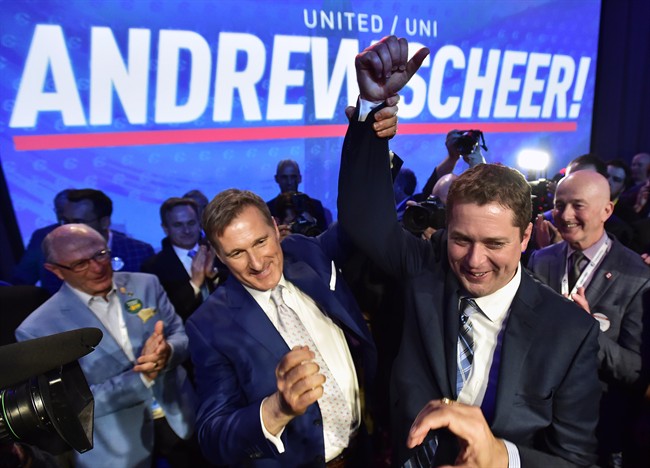There’s a lot we may not yet know about new Conservative leader Andrew Scheer, but it’s probably fair to state this much with certainty: he’s no Maxime Bernier.

Whatever policy vagueness Scheer may have demonstrated on the campaign trail, it seems fairly clear that he embodies few of the Libertarian ideals that fuelled Bernier’s campaign. But given Bernier’s success in the race — winning on the first ballot before losing by the narrowest of margins twelve ballots later — it would be a mistake for the Conservative Party to shun those ideals.
READ MORE: University of Regina professor weighs in on Andrew Scheer’s federal Conservative Party win
Case in point is supply management of the dairy industry, a policy that is antiquated, protectionist, costly, regressive, and totally at odds with what the Conservative Party professes to represent. For far too long this has been a third rail in Canadian politics. Not even the Harper government dared to mess with the status, even vowing to protect supply management during negotiations around the Trans Pacific Partnership.
However, the fact that Bernier so enthusiastically embraced the dismantling of the cartel and remained for so long the front-runner in the leadership race suggests that maybe the tide is turning, at least within the Conservative Party. Scheer seems especially unlikely to lead the charge for reform, given his embrace of supply management and the support he received from the dairy industry, but party members can still have something to say about it.

Get breaking National news
WATCH: Maxime Bernier questions government regarding Bombardier, Boeing spat

Supply management, with its production quotas, massive import tariffs, and artificially inflated prices for consumers, seems like something from a bygone era — an era of wage and price controls, the National Energy Program, and government-run gas stations, airlines, and telecom.
The Conservative Party, presumably, would vigorously oppose a similar statist intervention in any other sector of the economy, especially if it meant imposing considerable costs on consumers. To that end, opposing supply management it not a big leap.
The Party’s constitution, for example, declares that the “best guarantors of the prosperity and well-being of (Canadians) are freedom of individual Canadians to pursue their enlightened and legitimate self-interest within a competitive economy.”
READ MORE: How Andrew Scheer pulled off a major Conservative Party upset
That sounds like a solid philosophical foundation for making the case against supply management. Moreover, one might even describe it as “attack on the wallets of every Canadian family,” which is how Andrew Scheer has described Ottawa’s proposed carbon pricing scheme.
As it happens, the Montreal Economic Institute (of which Bernier once served as executive vice-president) has laid out a simple and reasonable path forward, one that would finally bring about an end to supply management but also provide compensation to those whose livelihood is dependent on it.
Basically, it would involve the government imposing a small tax as a trade-off for doing away with the much larger milk tax that supply management imposes. A tax of 23-cents on a 2-litre carton of milk would generate sufficient funds to allow the government to buy back the production quotas from those who hold them. And even with that tax, Canadians would still be saving upwards of $2.50 on that carton of milk. That’s how much this policy “attacks the wallets” of Canadian consumers.
READ MORE: Who is new Conservative leader Andrew Scheer?
It’s not just about protecting consumers, though. as the Conference Board of Canada has pointed out, supply management actually holds back our dairy industry from competing on the international stage. Certainly Canada’s producers of beef, barley, lentils, and other commodities know full well the value and importance of exports.
To that end, the party that purports to represent lower costs for consumers as well as free and open trade should be the ones pushing us in that direction. Maxime Bernier and his followers understand that. Hopefully the rest of the party, and Andrew Scheer himself, will come to understand that, too.
Rob Breakenridge is host of “Afternoons with Rob Breakenridge” on Calgary’s NewsTalk 770 and a commentator for Global News.












Comments
Want to discuss? Please read our Commenting Policy first.